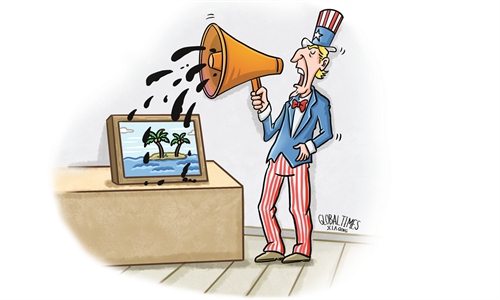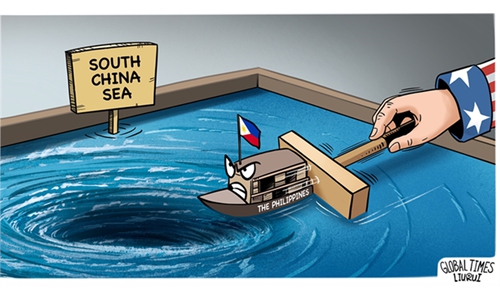
Philippines' President Ferdinand Marcos Jr. attended the Leaders' Plenary during the ASEAN-Australia Special Summit 2024 in Melbourne on March 6, 2024. Photo:AFP
The ASEAN-Australia Special Summit was held in Melbourne, Australia, on Wednesday to commemorate the 50th anniversary of ASEAN-Australia relations. The Philippines, one of the participants, had wanted to use this occasion to hype the South China Sea dispute as it has been deliberately triggering tensions with China in recent months. Prior to the summit, Philippine President Ferdinand Marcos Jr said during his address to the Australian parliament that he would not allow any foreign power to take "one square inch" of the country's territory, in a clear hint at China.
Obviously, Manila wants to bring its territorial disputes with China to the regional and international stage to garner support. Nonetheless, it has ended up being dismayed. In the Melbourne Declaration adopted after the summit, there was no mention of China. The document said, "We encourage all countries to avoid any unilateral actions that endanger peace, security and stability in the region." Both Australia and ASEAN as a whole know it well the unilateral actions of which countries have led to the tense situation in the region.
The Philippines' relationship with the US is the fundamental reason for its recent provocations against China. The Philippines' attempt to hijack ASEAN by exploiting the South China Sea issue to provide support for the US' Indo-Pacific Strategy is bound to be resisted by other ASEAN member states, Zhou Shixin, director of the Institute for Foreign Policy Studies at the Shanghai Institute for International Studies, told the Global Times. The stance of ASEAN toward the South China Sea issue has been consistent, which can be seen from its statements with various countries. When it said, "We recognize the benefits of having the South China Sea as a sea of peace, stability and prosperity," it does mean it.
Zhou noted that Australia's stance on the South China Sea issue is not mild. Also, in August last year, the Philippines and Australia conducted an air assault exercise near the South China Sea. In November, the two countries carried out their first joint sea and air patrols in the South China Sea.
However, Australia is clear that its maneuvers regarding the South China Sea issue are limited and their impacts are even more limited, said Zhou.
Indeed, it is easier for Australia to add fuel to the fire set by the Philippines than to pull chestnuts out of the fire for the Philippines. Even Australia, a close ally of the US, knows it's unnecessary to offend the other ASEAN countries and China just for the sake of the Philippines' motives. CNN ran an article on Monday titled "Why Australia keeps an arm's length from South China Sea tensions, even as it draws closer with the Philippines." The article cited analysts who said that Canberra's role in Southeast Asia is not decisive and it would be cautious about being dragged into any maritime security flashpoints.
Qin Sheng, a research fellow at the Center for Australia, New Zealand and South Pacific Studies, Chinese Academy of Social Sciences, believes that Australian Prime Minister Anthony Albanese doesn't want his diplomatic efforts aimed at improving his country's relations with China to be jeopardized by other issues. By keeping an arm's length from the South China Sea issue, Albanese hopes to separate China-Australia relations with other regional affairs.
According to media reports, Chinese Foreign Minister Wang Yi will pay a visit to Australia in the second half of March at the invitation of the Australian side, which would be "another milestone in warming of relations" during Albanese's tenure. Therefore, Qin noted, from the short-term perspective, Australia doesn't want to destroy the atmosphere before Wang's visit, and from a long-term view, Australia wants to keep the stable posture of bilateral relations.
Hopefully, the ASEAN-Australia Special Summit can prompt the Philippines to realize that rallying countries from outside the region in the South China Sea issue will not bring it desired results. It is not long before Marcos boasted that its territorial dispute with China is "a purely Filipino concern" and the Philippines intends to solve that problem itself. Is the Philippines walking away from its words? It had better come to the negotiation table with China to properly settle the disputes and play a constructive role in promoting the security and stability of the region.


